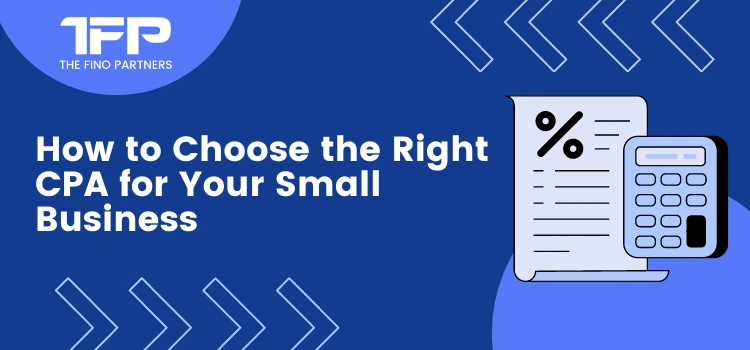One of the most essential economic choices you can make as a small business owner in the US is picking out a CPA. Based on the SBA, 20% of small businesses fail their very first year, often due to poor financial control. Having the proper CPA can make all the difference in taxation, bookkeeping and long term financial planning easier.
So, if you are starting a brand new business or looking to update your current financial processes, you want the right CPA.
Choosing the Right CPA for Your Small Business
Here’s how to pick the right CPA for your small business in America:
Find Your Business Needs
Before you begin searching for a CPA, determine what your business requires. Are you in need of assistance with everyday bookkeeping or are you more focused on filing taxes? Do you need somebody who specializes in payroll or are you planning long-range financials?
CPAs provide various accounting services; understanding your requirements are going to help you locate a CPA whose experience matches your business needs. Common areas of the help of CPAs consist of :
Tax Preparation & Filing: CPAs maintain your business compliant with local and federal tax laws.
Bookkeeping: Keeping your books in order can avoid financial chaos.
Payroll: Managing employee payments, deductions & filings.
Business Consulting: Advising on financial decisions (investments, budgeting, growth strategies).
Check Credentials & Experience
Not all accountants are CPAs. A CPA is one who has gone through a rigorous certification examination and is authorized to practice accounting; regular accountants might lack the very same expertise or legal authority. A CPA is apt to be on top of tax law and monetary laws.
When searching for accounting services, be certain the CPA you select is certified in your state. Ask about their expertise, particularly with small companies. You need someone who understands small business cash flow problems, scaling operations, and controlling business deductions.
Think about Industry Specific Expertise
Every industry has its financial complexities. As an example, a construction business has various tax concerns than a department store or maybe a software startup. In case your business is in a special business, locating a CPA with expertise in your business could be advantageous.
CPAs who provide industry specific accounting will know how you can structure your finances to optimize deductions and comply with regulations. Ask prospective CPAs if they've been effective with clients in your sector and the way they've helped very similar companies flourish.
Assess Communication Skills & Availability
You want a CPA who communicates clearly and is available whenever required. Financial issues are complicated, so make sure you ask your CPA questions. They ought to be able to explain tax laws, financial techniques, and accounting terms for you clearly.
Consider how frequently you will have to call your CPA. In case you require monthly financial reviews or even frequently consult, ensure they've time for your business. Some CPAs are more hands-on and only handle year end taxes; others provide ongoing accounting services including monthly bookkeeping or quarterly financial reviews.
Learn the Fee Structure
CPAs charge by the hour, on a retainer, or per service (for example tax filing or payroll). Understand how CPAs cost and what's included in their accounting services is essential prior to hiring one.
Although prices are definitely an element, you shouldn't select a CPA based on cost alone. A bit more for a skilled CPA may save you cash in the long term by obtaining tax savings or staying away from costly financial mistakes.
Request a breakdown of fees so you can compare CPA alternatives. Clarify exactly what services you will require and if these are included in their regular prices.
Ask for References & Reviews
Ask references from other small businesses to see possible CPAs. Online reviews or testimonials can also be offered. A good CPA should have a successful record of providing accurate accounting services.
Ask previous or present clients about their experience dealing together with the CPA. Were they responsive? Did they increase financial efficiency? Did they provide solutions to complex problems?
Online review websites like Yelp, Google Reviews, or LinkedIn can also reveal details in regards to a CPA's reputation. Watch for feedback which mentions their performance with small businesses, as this is relevant for you.
Final Thoughts
The right CPA could make or break your small business. By understanding your business requirements, examining credentials and industry experience, you can find a CPA that can offer accounting services specific to your company. Do not just focus on price, rather find a CPA who can save you time, stress and money by dealing with your monetary problems.
For complete tax compliance and accounting support, turn to The Fino Partners to keep your business on track with financial responsibilities.




























